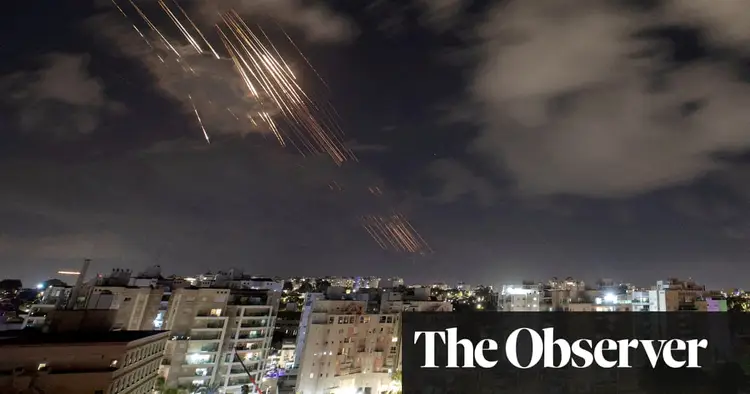Israel ‘preparing response’ to Iran attack as 7 October anniversary looms

The Israeli military is broadening its activities on several fronts as the anniversary of the October 7 attacks approaches this Monday. They are also preparing for a major and serious response to Iran in light of the recent extensive missile assault on Israel.
Indications of a possible Israeli response to Iran emerged as French President Emmanuel Macron urged the international community to impose an arms embargo on supplies going to Israel that could be utilized in Gaza. Reports suggest that over 41,000 Palestinians have lost their lives during Israel's ongoing military campaign over the past year.
"Today, I believe our main focus should be on finding a political resolution and halting the supply of weapons for the conflict in Gaza," Macron stated during an interview with France Inter. He also emphasized that France is not supplying any arms to Israel.
Macron shared his thoughts while the Israel Defense Forces announced that a significant attack on Iran was on the horizon. Meanwhile, on Saturday, Israel targeted locations in Lebanon, Syria, and Gaza.
A military official, who spoke on the condition of anonymity due to restrictions on public statements, indicated that the Israeli Defense Forces are getting ready to respond to the unprecedented and illegal assault by Iran on Israeli citizens and the state of Israel.
While Israel announced its strategy in response to the Iranian missile attacks that targeted several important military bases, U.S. President Joe Biden warned against targeting Iranian oil facilities. This warning came just one day after he mentioned that the U.S. was considering such measures.
“If I were in their position, I would consider options other than attacking the oilfields,” Biden remarked during an uncommon appearance at the White House press briefing. The Biden administration has also indicated that it does not support an Israeli attack on Iran’s nuclear program.
As the violence escalated, there were growing rumors that a strike in the southern suburbs of Beirut resulted in the death of Hashem Safieddine, who many believed would take over leadership from the deceased Hassan Nasrallah of Hezbollah. Lebanese security officials reported that Safieddine has been out of contact since Friday.
Reports indicate that Safieddine was killed along with his staff and Iranian advisors in a significant attack, making it challenging to retrieve any remains. Following the strike, the IDF announced that it targeted Hezbollah’s intelligence center but did not reveal who was there at the time.
The violence escalates as Israel readies to commemorate the one-year anniversary on Monday of the horrific Hamas assault that occurred on October 7, which triggered the ongoing conflict in Gaza. This conflict has now spilled over into neighboring Lebanon, leading to a precarious regional situation.
Israel's president, Isaac Herzog, will preside over a memorial event in Sderot, one of the cities most severely affected by the attacks from Hamas militants. This is taking place alongside concerns that the anniversary could incite new assaults on Israeli citizens.
On Saturday, the Israeli military announced that it was instructing Palestinian residents in certain parts of the Gaza Strip, including Nuseirat and Bureij—areas home to many internally displaced individuals—to leave. They stated that the Israel Defense Forces intended to take significant military action against Hamas in those locations.
Over the weekend, Israel seemed to be intensifying its activities in southern Lebanon, where its ground troops had entered earlier in the week.
Hezbollah in Lebanon announced that it was resisting Israeli efforts to invade the southern town of Odaisseh, and noted that fighting was continuing.
Hezbollah continued to launch rockets into northern Israel, striking two buildings in Karmiel and near Acre. There were reports of injuries following a hit on an apartment block in the Israeli-Arab village of Deir al-Asad.
Israel commenced ground operations in southern Lebanon last Monday, indicating that their efforts are concentrated on villages close to the border. They have stated that Beirut is not a target, but they have not provided details on the expected duration of the incursion.
The goal of the operation is to enable many thousands of its citizens to come back home. They were compelled to leave the northern region due to the shelling by Hezbollah, which started on October 8, 2023.
The surge in violence over the past few days has led to significant Israeli attacks on Hezbollah positions throughout Lebanon, while ground forces carried out operations close to the border. This escalation has turned nearly a year of intermittent clashes into a full-scale conflict.
In the initial reported airstrike by Israel on the northern area of Tripoli during the current conflict, Hamas stated that the “Zionist attack” on the Beddawi refugee camp resulted in the deaths of a commander named Saeed Atallah Ali, as well as his wife and two daughters, on Saturday.
As concerns grow about the escalating regional crisis, Iran's foreign minister, Abbas Araghchi, once again urged for ceasefires in both Gaza and Lebanon on Saturday.
"The key priority right now is establishing a ceasefire, particularly in Lebanon and Gaza," he informed the press. "There are efforts underway to address this, and we've been engaged in discussions that we hope will yield positive results."









































